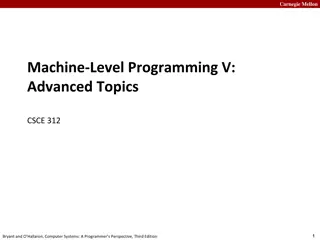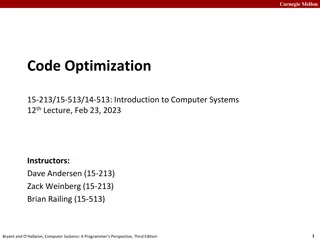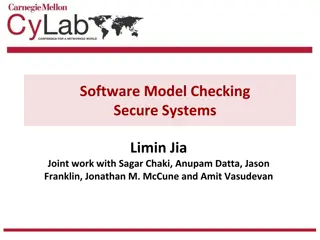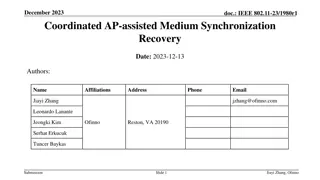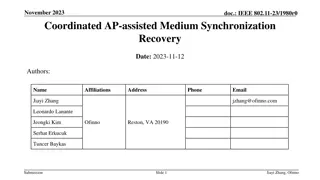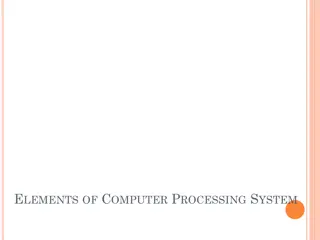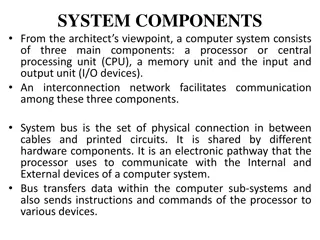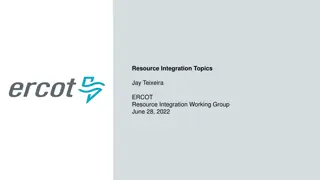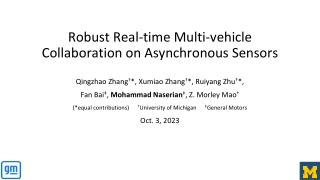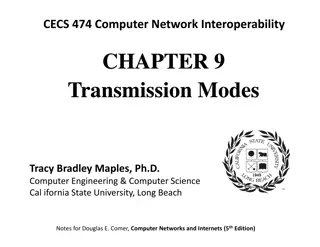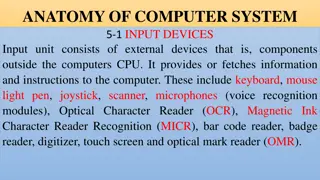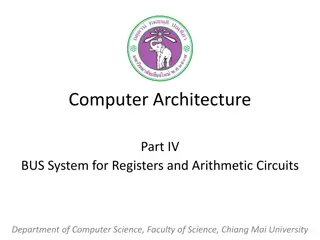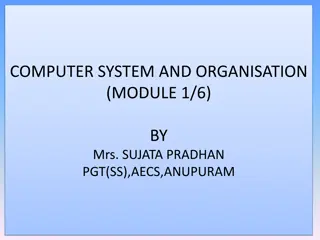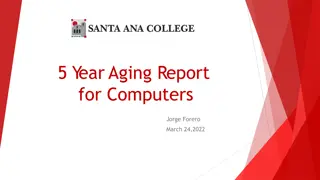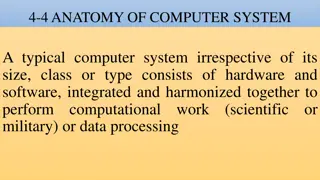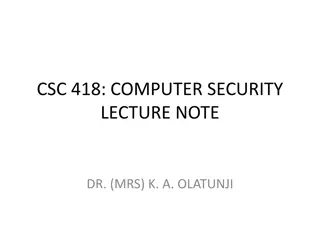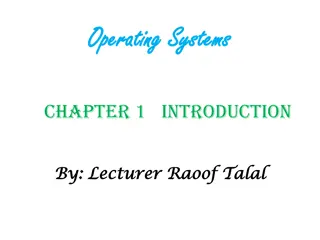Carnegie Mellon Synchronization and Computer Systems Lecture Updates
Carnegie Mellon's recent announcements include lab checkpoints and finals deadlines, as well as the release of an optional lab extension for the Shark File System. The lecture topics cover races, mutual exclusion, deadlock, semaphores, events, queues, reader-writer locks, starvation, and thread-safe API design, emphasizing the importance of synchronization in computer systems.
Download Presentation

Please find below an Image/Link to download the presentation.
The content on the website is provided AS IS for your information and personal use only. It may not be sold, licensed, or shared on other websites without obtaining consent from the author. Download presentation by click this link. If you encounter any issues during the download, it is possible that the publisher has removed the file from their server.
E N D
Presentation Transcript
Carnegie Mellon Synchronization: Advanced 15-213/14-513/15-513: Introduction to Computer Systems 24thLecture, November 30, 2023 1
Carnegie Mellon Announcements Proxy lab checkpoint due today (November 30) Proxy lab final due in one week (December 7) Anything after Dec 8 requires an incomplete! Code Reviews of Proxy TAs will review your last graded proxy submission No required meetings Either checkpoint or final (see next slide) Final exam Tuesday December 12 Look out for more details on Piazza Accommodations information: https://piazza.com/class/llpgaho5sjp63w/post/2195 2
Carnegie Mellon Announcements continued SFS Lab Release afternoon on 12/1 Lab is optional (highest of proxy final and sfslab score) Summary Extending the Shark File System (SFS) in two ways Implementing several APIs getpos, seek, rename Adding appropriate synchronization for parallel execution Excitement and warning! It is new and covers concepts not assessed elsewhere It is *new* and may break in exciting ways 3
Carnegie Mellon Today Review: Races, Mutual Exclusion Deadlock Semaphores, Events, and Queues Reader-Writer Locks and Starvation Thread-Safe API Design 4
Carnegie Mellon Races A race occurs when correctness of the program depends on one thread reaching point x before another thread reaches point y Thread 2 int cnt; safe int main(int argc, char** argv) { pthread_t t1, t2; Pthread_create(&t1, NULL, thread, NULL); Pthread_create(&t2, NULL, thread, NULL); Pthread_join(t1, NULL); Pthread_join(t2, NULL); return (counter != 20000); } T2 S2 U2 Unsafe region /* thread routine */ void *thread(void *vargp) { for (int i = 0; i < 10000; i++) cnt++; return NULL; } unsafe L2 H2 Thread 1 H1 L1 U1 S1 T1 5
Carnegie Mellon Races Some races can be fixed with mutual exclusion int cnt; pthread_mutex_t lock = PTHREAD_MUTEX_INITIALIZER; int main(int argc, char** argv) { pthread_t t1, t2; Pthread_create(&t1, NULL, thread, NULL); Pthread_create(&t2, NULL, thread, NULL); Pthread_join(t1, NULL); Pthread_join(t2, NULL); return (counter != 20000); } void *thread(void *vargp) { for (int i = 0; i < 10000; i++) { pthread_mutex_lock(&lock); cnt++; pthread_mutex_unlock(&lock); } return NULL; } 6
Carnegie Mellon Races Not all races can be addressed with mutual exclusion int main(int argc, char** argv) { pthread_t tid[N]; int i; for (i = 0; i < N; i++) Pthread_create(&tid[i], NULL, thread, &i); for (i = 0; i < N; i++) Pthread_join(tid[i], NULL); return 0; } /* thread routine */ void *thread(void *vargp) { int myid = *(int *)vargp; printf("Hello from thread %d\n", myid); return NULL; } 7
Carnegie Mellon Races Not all races can be addressed with mutual exclusion int main(int argc, char** argv) { pthread_t tid[N]; int i; for (i = 0; i < N; i++) Pthread_create(&tid[i], NULL, thread, &i); for (i = 0; i < N; i++) Pthread_join(tid[i], NULL); return 0; } Thread printf /* thread routine */ void *thread(void *vargp) { int myid = *(int *)vargp; printf("Hello from thread %d\n", myid); return NULL; } myid = start Parent i=0 &i PC i++ 8
Carnegie Mellon Races This race can be fixed by copying data int main(int argc, char** argv) { pthread_t tid[N]; int i; for (i = 0; i < N; i++) Pthread_create(&tid[i], NULL, thread, (void *)i); for (i = 0; i < N; i++) Pthread_join(tid[i], NULL); return 0; } /* thread routine */ void *thread(void *vargp) { int myid = (int)vargp; printf("Hello from thread %d\n", myid); return NULL; } 9
Carnegie Mellon Races This race can also be fixed with a semaphore sem_t sem; int main(int argc, char** argv) { pthread_t tid[N]; int i; Sem_init(&sem, 0, 0); // initially closed for (i = 0; i < N; i++) { Pthread_create(&tid[i], NULL, thread, &i); sem_wait(&sem); } for (i = 0; i < N; i++) Pthread_join(tid[i], NULL); return 0; } void *thread(void *vargp) { int myid = *(int *)vargp; sem_post(&sem); printf("Hello from thread %d\n", myid); return NULL; } 10
Carnegie Mellon Not all races involve threads $ rm myfile.txt Time of check to time of use (TOCTOU) Check Use if (access("myfile.txt", R_OK) == 0) { FILE *fp = fopen("myfile.txt", "r"); while (fgets(fp, buf, sizeof buf) != NULL) process_line(buf); fclose(fp); } else { fprintf(stderr, "myfile.txt not found\n"); } Fix: Don t check, just use (but be ready for failure) FILE *fp = fopen("myfile.txt", "r"); if (fp) { while (fgets(fp, buf, sizeof buf) != NULL) process_line(buf); fclose(fp); } else { fprintf(stderr, "myfile.txt: %s\n", strerror(errno)); } 11
Carnegie Mellon Races involving signal handlers Event happens earlier than anticipated void sigchld_handler(int unused) { int status; pid_t pid; while ((pid = waitpid(-1, &status, WNOHANG|WUNTRACED)) > 0) job_status_change(pid, status); } void start_fg_job(char **argv) { pid_t pid = fork(); if (pid == -1) { perror("fork"); return; } else if (pid == 0) { execve(argv[0], argv, environ); perror("execve"); exit(127); } else { add_job(pid, argv); } } SIGCHLD delivered 12
Carnegie Mellon Race Elimination Don t share state e.g. use malloc to generate separate copy of argument for each thread Don t check before using Attempt to use, see if it failed Use synchronization primitives Which synchronization primitive? Depends on the situation 13
Carnegie Mellon Today Review: Races, Mutual Exclusion Deadlock Semaphores, Events, and Queues Reader-Writer Locks and Starvation Thread-Safe API Design 14
Carnegie Mellon Deadlock A program is deadlocked when it is waiting for an event which cannot ever happen Mathematical impossibility, not just practical Most common form: Thread A is waiting for thread B to do something Thread B is waiting for thread A to do something Neither can make forward progress 15
Carnegie Mellon Deadlock caused by wrong locking order void *thread_1(void *arg) { pthread_mutex_lock(&mA); pthread_mutex_lock(&mB); void *thread_2(void *arg) { pthread_mutex_lock(&mB); pthread_mutex_lock(&mA); // do stuff ... // do stuff ... pthread_mutex_unlock(&mA); pthread_mutex_unlock(&mB); } pthread_mutex_unlock(&mB); pthread_mutex_unlock(&mA); } Live coding demo: deadlocks 16
Carnegie Mellon Deadlock Visualized in Progress Graph Any trajectory that enters the deadlock region will eventually reach the deadlock state where each thread is waiting for the other to release a lock Thread 1 Deadlock state: cannot move up or right both threads are stuck U(b) Forbidden region for b U(a) Other trajectories luck out and skirt the deadlock region Unfortunate fact: trajectory variations may mean deadlock bugs are nondeterministic (don t always manifest, making them hard to debug) L(b) Forbidden region Deadlock region for a L(a) Thread 0 L(b) L(a) U(b) U(a) 17
Carnegie Mellon Fix this deadlock with consistent ordering void *thread_1(void *arg) { pthread_mutex_lock(&mA); pthread_mutex_lock(&mB); Always possible to move up or move right U(b) // do stuff ... Forbid- den region for b pthread_mutex_unlock(&mA); pthread_mutex_unlock(&mB); } U(a) void *thread_2(void *arg) { pthread_mutex_lock(&mA); pthread_mutex_lock(&mB); L(b) Forbidden region for a L(a) // do stuff ... pthread_mutex_unlock(&mB); pthread_mutex_unlock(&mA); } L(a) L(b) U(b) U(a) Inconsistent unlock order does not matter 18
Carnegie Mellon Today Review: Races, Mutual Exclusion Deadlock Semaphores, Events, and Queues Reader-Writer Locks and Starvation Thread-Safe API Design 19
Carnegie Mellon Recall: Semaphores Integer value, always >= 0 P(s) operation (aka sem_wait) If s is zero, wait for a V operation to happen. Then subtract 1 from s and return. V(s) operation (aka sem_post) Add 1 to s. If there are any threads waiting inside a P operation, resume one of them Any thread may call P; any thread may call V; no ordering requirements Key difference from mutexes 20
Carnegie Mellon Semaphores for Events Remember this program from Tuesday s quiz? #define N 4 long *pointers[N]; int main(void) { long i; pthread_t tids[N]; void *thread(void *vargp) { long myid = (long) vargp; pointers[myid] = &myid; sleep(2); return NULL; } for (i = 0; i < N; i++) Pthread_create(&tids[i], NULL, thread, (void *) i); sleep(1); for (i = 0; i < N; i++) printf("Thread #%ld has " "local value %ld\n", i, *pointers[i]); for (i = 0; i < N; i++) Pthread_join(tids[i], NULL); return 0; } Let s fix it. With semaphores. Live coding demo: event semaphores 21
Carnegie Mellon Semaphores for Events int main(void) { long i; pthread_t tids[N]; #define N 4 long *pointers[N]; sem_t ready[N]; sem_t finish; Sem_init(&finish, 0, 0); for (i = 0; i < N; i++) { Sem_init(&ready[i], 0, 0); Pthread_create(&tids[i], NULL, thread, (void *) i); } for (i = 0; i < N; i++) { sem_wait(&ready[i]); printf("Thread #%ld has " "local value %ld\n", i, *pointers[i]); } for (i = 0; i < N; i++) sem_post(&finish); for (i = 0; i < N; i++) Pthread_join(tids[i], NULL); return 0; } void *thread(void *vargp) { long myid = (long) vargp; pointers[myid] = &myid; sem_post(&ready[myid]); sem_wait(&finish); return NULL; } 22
Carnegie Mellon Queues, Producers, and Consumers shared queue producer thread consumer thread Common synchronization pattern: Producer waits for empty slot, inserts item in queue, and notifies consumer Consumer waits for item, removes it from queue, and notifies producer Examples Multimedia processing: Producer creates video frames, consumer renders them Event-driven graphical user interfaces Producer detects mouse clicks, mouse movements, and keyboard hits and inserts corresponding events in queue Consumer retrieves events from queue and paints the display 23
Carnegie Mellon Producer-Consumer on 1-entry Queue Maintain two semaphores: full + empty full 0 empty buffer empty 1 full 1 full buffer empty 0 24
Carnegie Mellon Why 2 Semaphores for 1-entry Queue? Consider multiple producers & multiple consumers P1 C1 shared queue Pn Cm Producers will contend with each to get empty Consumers will contend with each other to get full Producers Consumers empty full P(&shared.empty); shared.buf = item; V(&shared.full); P(&shared.full); item = shared.buf; V(&shared.empty); 25
Carnegie Mellon Producer-Consumer on n-element Queue Between 0 and n elements P1 C1 Pn Cm Requires a mutex and two counting semaphores: mutex: enforces mutually exclusive access to the queue s innards slots: counts the available slots in the queue items: counts the available items in the queue Makes use of semaphore values > 1 (up to n) 26
Carnegie Mellon Today Review: Races, Mutual Exclusion Deadlock Semaphores, Events, and Queues Reader-Writer Locks and Starvation Thread-Safe API Design 27
Carnegie Mellon Readers-Writers Problem W1 R1 Read/ Write Access Read-only Access W2 R2 W3 R3 Problem statement: Reader threads only read the object Writer threads modify the object (read/write access) Writers must have exclusive access to the object Unlimited number of readers can access the object Occurs frequently in real systems, e.g., Online airline reservation system Multithreaded caching Web proxy 28
Carnegie Mellon Pthreads Reader/Writer Lock Data type pthread_rwlock_t Operations Acquire read lock pthread_rwlock_rdlock(pthread_rwlock_t *rwlock) Acquire write lock pthread_rwlock_wrlock(pthread_rwlock_t *rwlock) Release (either) lock pthread_rwlock_unlock(pthread_rwlock_t *rwlock) Must be used correctly! Up to programmer to decide what requires read access and what requires write access 29
Carnegie Mellon Reader/Writer Starvation Thread 1 has a read lock. Thread 2 is waiting for a write lock. Thread 3 tries to take a read lock. What happens? R1 W ? R2 Option 1: R2 gets read lock immediately Endless stream of overlapping readers W waits forever R1 W R2 Option 2: Writer always gets lock as soon as possible Endless stream of overlapping writers readers wait forever R1 W R2 (not shown) 30
Carnegie Mellon Starvation A thread is starved when it makes no forward progress for an unacceptably long time Unlike deadlock, it s possible for it to get unstuck eventually Unacceptably long depends on the application Algorithms that guarantee no starvation are called fair Fair R/W locks: every waiter receives the lock in first-come first- served order (several readers can receive the lock at the same time) R1 W R2 Fairness is more complicated to implement Fairness can mean all threads are slower than they would be in an unfair system (e.g. lock convoy problem ) 31
Carnegie Mellon Quiz https://canvas.cmu.edu/courses/37116/quizzes/109933 32
Carnegie Mellon Today Review: Races, Mutual Exclusion Deadlock Semaphores, Events, and Queues Reader-Writer Locks and Starvation Thread-Safe API Design 33
Carnegie Mellon Thread-Safe APIs A function is thread-safe if it always produces correct results when called repeatedly from multiple concurrent threads. Reasons for a function not to be thread-safe: 1. Internal shared state, no locking (e.g. your malloc) 2. Internal state modified across multiple uses (e.g. rand) 3. Returns a pointer to a static variable (e.g. strtok) 4. Calls a function that does any of the above 34
Carnegie Mellon Thread-Unsafe Functions (Class 1) These functions would be thread-safe if they began with pthread_mutex_lock(&l) and ended with pthread_mutex_unlock(&l) for some lock L Good example: malloc, realloc, free Your implementation will crash if called from multiple concurrent threads The C library s implementation won t; it has internal locks Locking slows things down, of course 35
Carnegie Mellon Thread-Unsafe Functions (Class 2) Relying on persistent state across multiple function invocations Example: Random number generator that relies on static state static unsigned int next = 1; /* rand: return pseudo-random integer on 0..32767 */ int rand(void) { next = next*1103515245 + 12345; return (unsigned int)(next/65536) % 32768; } /* srand: set seed for rand() */ void srand(unsigned int seed) { next = seed; } Difference from class 1: locking would not fix the problem 2 threads call rand() simultaneously, both get different results than if only one made a sequence of calls to rand() 36
Carnegie Mellon Fixing Class 2 Thread-Unsafe Functions Pass state as part of argument and, thereby, eliminate static state /* rand_r - return pseudo-random integer on 0..32767 */ int rand_r(int *nextp) { *nextp = *nextp*1103515245 + 12345; return (unsigned int)(*nextp/65536) % 32768; } Requires API change Callers responsible for allocating space for state 37
Carnegie Mellon Thread-Unsafe Functions (Class 3) /* Convert integer to string */ char *itoa(int x) { static char buf[11]; snprintf(buf, 11, "%d", x); return buf; } Returning a pointer to a static variable Like class 2, locking inside function would not help Race between use of result and calls from another thread Fix: make caller supply space for result Requires API change (also like class 2) Can be awkward for caller: how much space is required? /* Convert integer to string (thread-safe) */ void itoa_r(int x, char *buf, size_t bufsz) { snprintf(buf, bufsz, "%d", x); } 38
Carnegie Mellon Thread-Unsafe Functions (Class 4) Calling thread-unsafe functions Any function that uses a class 1, 2, or 3 function internally is just as thread-unsafe as that function itself This applies transitively Only fix is to modify the function to use only thread-safe functions This may or may not involve API changes 39
Carnegie Mellon Thread-Safe Library Functions Most ISO C library functions are thread-safe Examples: malloc, free, printf, scanf Exceptions: strtok, rand, asctime, Many older Unix C library functions are unsafe There is usually a safe replacement Thread-unsafe function asctime ctime localtime gethostbyname gethostbyaddr inet_ntoa rand Class 3 3 3 3 3 3 2 Reentrant version strftime strftime strftime getaddrinfo getnameinfo getnameinfo rand_r* * The C library s random number generators are all old and not very strong . Use a modern CSPRNG instead. 40
Carnegie Mellon Reentrant Functions Def: A function is reentrant if it accesses no shared variables when called by multiple threads. Important subset of thread-safe functions Require no synchronization operations Only way to make a Class 2 function thread-safe is to make it reentrant (e.g., rand_r ) All functions Thread-safe functions Thread-unsafe functions Reentrant functions 41
Carnegie Mellon Threads / Signals Interactions Receive signal fprintf.lock() Icurr Inext Handler fprintf.unlock() Many library functions use lock-and-copy for thread safety malloc Free lists fprintf, printf, puts So that outputs from multiple threads don t interleave snprintf Calls malloc internally for scratch space OK to interrupt them with locks held as long as the handler doesn t use them itself! 42
Carnegie Mellon Bad Thread / Signal Interactions Receive signal fprintf.lock() Icurr Inext Handler fprintf.lock() fprintf.unlock() fprintf.unlock() What if: Signal received while library function holds lock Handler calls same (or related) library function Deadlock! Signal handler cannot proceed until it gets lock Main program cannot proceed until handler completes Key Point Threads employ symmetric concurrency Signal handling is asymmetric 43



